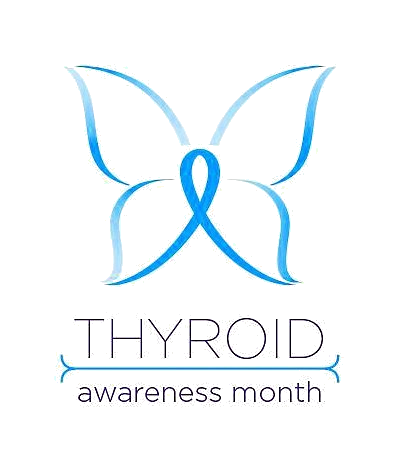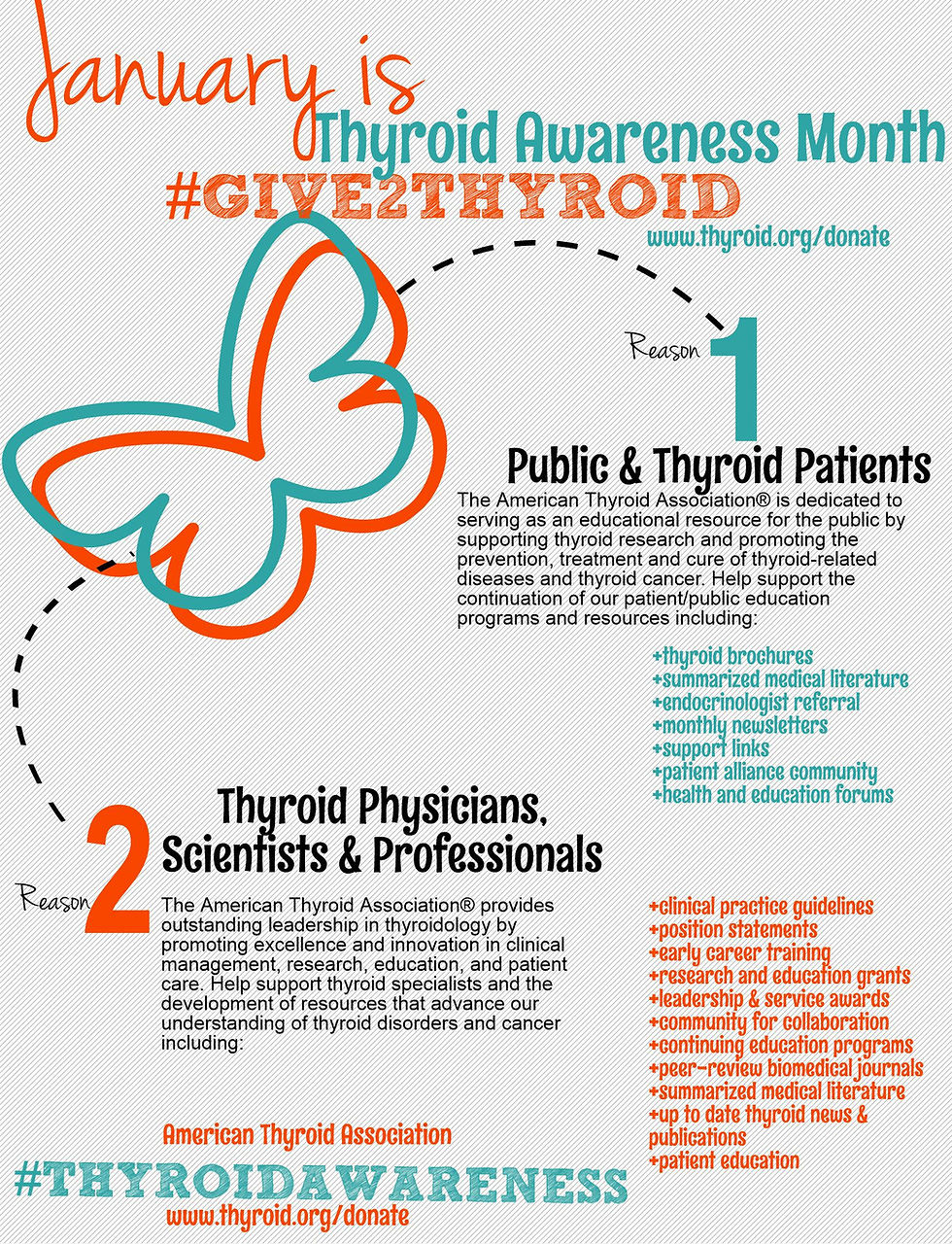Let’s Discuss Hashimoto’s Thyroiditis by Stephanie Strozuk, MD, FAAP
- Bergen County Moms

- Jan 11, 2019
- 3 min read
Updated: Feb 1, 2019

January is National Thyroid Awareness Month
Did you know that over 20 million Americans have some form of thyroid dysfunction? According to the American Thyroid Association, up to 60% of those with thyroid disease are unaware that they have the condition. Women are five to eight times more likely than men to have thyroid disease and one in eight women will develop a thyroid disorder during her lifetime.

So what exactly is the thyroid and why might its function go awry? The thyroid is a butterfly shaped gland that sits in the middle of your neck. Although this gland is relatively small in size, it produces hormones (triiodothyronine and thyroxine) that influence every cell and organ in the body. Hypothyroidism is a condition where the thyroid produces too little hormone while hyperthyroidism is a condition where the thyroid produces too much thyroid hormone. Symptoms of hypothyroidism include weight gain, brain fog, constipation, fatigue and mood disorders to name a few. Symptoms of hyperthyroidism include nervousness, unexplained weight loss, palpitations and heat intolerance.
In fact, 90% of cases of hypothyroidism are actually autoimmune in nature. What is important to note is that autoimmune hypothyroidism- called Hashimoto’s Thyroiditis - is not purely a problem with the thyroid gland. It is actually a problem of the immune system. The immune system is attacking the thyroid gland causing it to under produce its hormones which in turn slows down all of the body’s metabolic processes. But why does this happen?
We know that autoimmune thyroiditis has genetic underpinnings. But as we know, our genes are not necessarily our destiny. As I tell my patients quite often, our genes may load the proverbial gun, but our environment pulls the trigger. Let’s take a closer look…
We know through the pioneering work of Dr. Alessio Fasano, Chief of Pediatric Gastroenterology and Nutrition at Mass General Hospital, that in order for an autoimmune disease to take hold, we need three things: 1) a genetic predisposition 2) a trigger from our environment and 3) intestinal permeability or “leaky gut”. When the tight junctions in our intestinal wall become loosened ( due to a multitude of reasons including inflammatory foods, stress, medications, environmental toxins and infections to name a few) things like undigested food particles, microbes and toxins enter our bloodstream and set off an inflammatory or immune response to deal with the invaders. Unfortunately our own tissues may get caught in the crossfire and if the genetic predisposition is there, an autoimmune disease may take hold.
So once this train has left the station, what can we do to quell the autoimmune process? Here are some actionable tips:
Heal your gut – 80% of your entire immune system is located in your digestive tract. To help halt and reverse the autoimmune process, we should work on restoring healthy gut function by removing inflammatory foods and infections, replacing enzymes needed for healthy digestion, reinocculating our gut with healthy bacteria from probiotics or probiotic rich foods and repairing the gut lining with nutrients.
Optimize your diet – eat a diet rich in whole, phytonutrient rich foods and avoid processed, inflammatory foods.
Eliminate toxins in your environment – by filtering your water, avoiding chemical laden body products and household cleaners.
Heal Infections- a number of infections have been associated with autoimmune disease including Epstein Barr Virus and Yersinia Enterocolitica to name a few. Work with your doctor to see if you may have an infection that may be contributing to your autoimmune process.
Relieve your stress- find what works for you. Proper thyroid and immune function depends on healthy adrenal glands. Send your body a signal of safety and decrease stress hormone production through practicing yoga, meditation, journaling or perhaps going on nature walks.
The interplay between the endocrine and immune system is a complicated web. It can take some time to figure out your own personal autoimmune triggers that led to the diagnosis of Hashimoto’s Thyroiditis. Figuring out your root causes and triggers, finding the right supplementation and medications may take some time. Work closely with your physician to dig deep to achieve optimal wellness!
Stephanie Strozuk, MD, FAAP is the founder of Evolved Adolescent and Young Adult Medicine- New Jersey's only private integrative medical practice dedicated exclusively to the health and wellbeing of tweens, teens and young adults. Dr. Strozuk is board certified in both Pediatrics and Adolescent and Young Adult Medicine. She has held academic positions at the Mount Sinai School of Medicine and at Rutgers - Robert Wood Johnson School of Medicine. She has also obtained additional training through the Institute for Functional Medicine and uses a functional medicine approach in her practice.







Comments